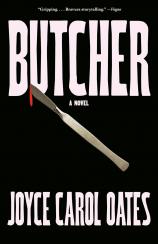Butcher
Review
Butcher
In BUTCHER, a masterful blend of fiction and fact, Joyce Carol Oates continues to explore the human psyche by taking a deep dive into its dark side.
Dr. Silas Weir was a controversial medical practitioner who worked during the 19th century and earned the moniker “Father of Gyno-Psychiatry.” Due to both his own perverse curiosity and the fact that surgery and treatment for patients was nowhere near what it is today, he also gained a reputation as a sadist and was given the nickname “Butcher.” This story is narrated by Weir’s oldest son, Jonathan, and the chapters are based on either Weir’s journals or the viewpoints of various individuals who worked with him during his heyday.
"I cannot think of many other writers who would handle this material and subject matter as expertly as Joyce Carol Oates, a pillar of modern literature who can get inside the minds of her characters like no one else can."
Jonathan lets readers know from the start that coverage of his father’s life and career falls into two categories: support and denunciation. Weir is not a physically attractive man, which somehow mirrors his soul. His failure to connect with women on any level plays a large part in his later treatment of them as a physician, and his misogynistic nature takes control of him. When Weir begins his practice of women’s health, he realizes that he knows next to nothing about the opposite sex. Being a virgin at the start also exemplifies how untrained and unskilled he is when dealing with the female reproductive system. Hence, his mishandling of examinations and treatments is both gory and horrific, made even more so by the fact that it is all accepted because he is a man and a doctor.
Starting with mannequins does not prepare Weir for human beings, and early on his mistakes in the operating room are tragic. Women are being deformed and misdiagnosed, and even infants are dying at his inept hands. During this point in his career, Weir thinks that “[t]he physical repulsiveness of the female body is not a matter of race, ethnic identity, or tincture of skin; rather, an inheritance from Eve accepted as such by the wisest females.” When a distant relative of Weir’s brings him on board at the New Jersey State Asylum for Female Lunatics in Trenton, a true monster is born and set free to do whatever he wants with these patients, who often are treated as less than human.
With Weir believing that all lunacy stems from some kind of infection, he makes it his business to experiment with various forms of treatment and surgical procedures that might remind you of the sadistic work of Dr. Josef Mengele during World War II. Were it not for his far more experienced assistant, a midwife named Gretel, Weir would have done even more harm than he actually does. When a relative is murdered by someone on the inside of the asylum, it falls on Weir to take over as the director.
One of the patients who follows Weir throughout his career is Brigit Kinealy, a mute Irish immigrant and a lower-level employee at the hospital. She is an indentured servant of the asylum and is subjected to years of various procedures at the hands of Weir. While he does eventually repair a fistula in her bladder, he does more harm than good. We also get to see how Jonathan becomes enamored and obsessed with Brigit right up until the very end of the story.
The asylum’s patients begin to speak and loudly chant about the “Red-Handed Butcher,” a stigma that will forever attach itself to Weir. We get to see passages and excerpts from Brigit’s own memoir, Lost Girl, Found: An Orphan’s True Story Told By Herself, in which she is more than forthcoming about the years spent at the asylum and the abuse she suffered at Weir’s hands.
There was some good that came from Weir’s practice as he became one of the first surgeons to experiment with different forms of anesthesia. This, along with some of the rare successful procedures he performed, has given him acclaim from the medical community, as well as having a statue erected in his name. The story ends with a huge, literal conflagration as we watch his career --- and eventually his life --- come to an end.
I cannot think of many other writers who would handle this material and subject matter as expertly as Joyce Carol Oates, a pillar of modern literature who can get inside the minds of her characters like no one else can. BUTCHER will rightfully shock and appall readers while also shining a light on a dark and uncertain time in the history of the treatment of females and psychologically challenged individuals.
Reviewed by Ray Palen on June 8, 2024
Butcher
- Publication Date: August 19, 2025
- Genres: Fiction, Historical Fiction
- Paperback: 352 pages
- Publisher: Vintage
- ISBN-10: 0593686004
- ISBN-13: 9780593686003




